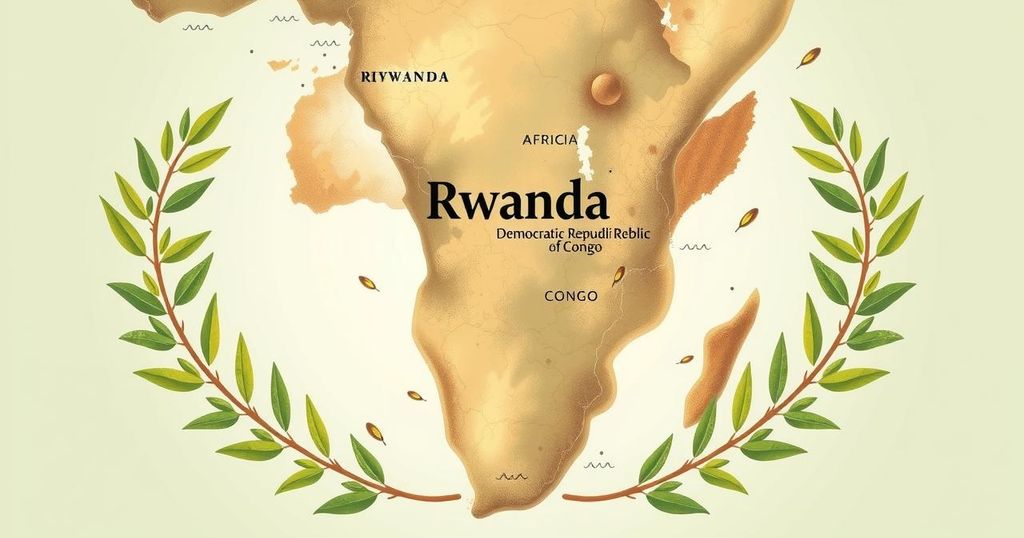Trump and Rubio Secure Rwanda-Congo Peace Treaty Amid Pakistan’s Nobel Prize Nomination
President Donald Trump and Secretary of State Marco Rubio have secured a peace treaty between Rwanda and the DRC. This announcement coincided with Pakistan’s formal nomination of Trump for the 2026 Nobel Peace Prize, commending his recent diplomatic engagement. However, skepticism about Trump’s influence in prior conflicts, particularly with India and Pakistan, continues to rise.
In a striking announcement made on Friday, President Donald Trump declared that he, alongside Secretary of State Marco Rubio, has brokered a significant peace treaty between Rwanda and the Democratic Republic of Congo. This treaty addresses a conflict infamous for its violent history that has reportedly lasted for decades. Representatives from both nations are scheduled to arrive in Washington on Monday for the official signing of the agreement.
In an unexpected twist, this diplomatic milestone coincides with Pakistan’s announcement of its formal nomination of Trump for the 2026 Nobel Peace Prize. Trump heralded the treaty on his social media platform, Truth Social, expressing pride in the achievement, while reflecting on his chances of winning the Nobel Prize. He did display a rather cynical view, stating he would likely not receive such an honor regardless of his efforts.
“This is a Great Day for Africa and, quite frankly, a Great Day for the World,” Trump said. He went on to list a number of major peace initiatives he has undertaken, claiming, “I won’t get a Nobel Peace Prize for this… but the people know, and that’s all that matters to me!” His comments came amid existing skepticism regarding his role in previous international conflicts, particularly between India and Pakistan.
Indian Foreign Secretary Vikram Misri promptly countered Trump’s assertions concerning peace between India and Pakistan, clarifying that the de-escalation talks were conducted directly between the two nations without U.S. mediation. Misri emphasized that India does not accept foreign mediation in such issues, an ongoing point of contention in the region.
The Nobel Prize discussion gained traction shortly after Pakistan’s government made a detailed post on X, advocating for Trump’s nomination. They commended his role in navigating a turbulent India-Pakistan situation recently. According to the post, Trump utilized decisive diplomacy that showcased his leadership qualities, aiming to stabilize a tense geopolitical landscape.
Pakistani officials praised Trump for demonstrating strategic foresight during the crisis, describing his intervention as instrumental in achieving a ceasefire. They viewed this as reflective of his ongoing commitment to resolving conflicts through dialogue, particularly regarding the sensitive Kashmir dispute, which has long plagued relations between India and Pakistan.
The statement from Pakistan also highlighted Trump’s previous engagement on issues stemming from ongoing crises in other regions, which they believe bolster his nomination for the Peace Prize. As per the requirements laid out by the Nobel Peace Prize organization, nominations must come from qualified nominators, including heads of state and prior laureates, with the final entries due by January 31.
As these developments unfold, the international community watches closely, particularly in light of the significant implications for peace in the region. The intertwining of Trump’s diplomatic efforts and Pakistan’s endorsement presents an intriguing chapter in ongoing global politics. While the efficacy of the treaty and the validity of the nomination remain subjects of debate, the potential impacts on regional stability are undeniable.
This recent treaty could signal new pathways for peace in long turbulent areas, but skepticism about the broad implications of Trump’s diplomatic legacy lingers, especially amid intense scrutiny of the global political landscape.
To summarize, President Trump’s recent announcement of a peace treaty between Rwanda and Congo is met with simultaneous news of his nomination for the 2026 Nobel Peace Prize from Pakistan. While he expresses pride in the treaty, doubts about his contributions to global peace efforts linger, particularly following counterclaims regarding his role in India-Pakistan relations. As the international community reflects on these events, the potential outcomes for regional stability remain a critical consideration moving forward.
Original Source: www.foxnews.com




Post Comment